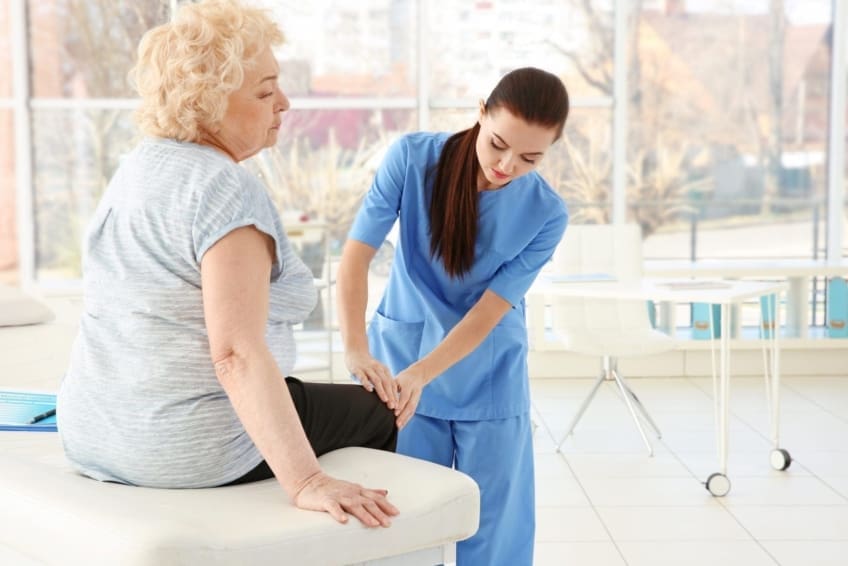
What is osteopenia?
Osteopenia is a condition that begins as you lose bone mass and your bones get weaker. This happens when the inside of your bones become brittle from a loss of calcium. It’s very common as you age. Total bone mass peaks around age 35. Sometimes, osteopenia is a precursor to osteoporosis. People who have osteopenia are at a higher risk of having osteoporosis.
Symptoms of osteopenia
Most people who have osteopenia don’t have symptoms. Loss of bone mass isn’t painful. Broken bones or fractures can occur, but these problems tend to happen once you have osteoporosis.
What causes osteopenia?
During your life, your bones constantly change. New bone grows while old bone breaks down and your body absorbs it. When you’re young, you grow new bone faster than your body breaks down old bone. This contributes to a high bone mass. Once your body starts to break down old bone faster than it creates new bone, your bone mass begins to decrease. Loss of bone mass weakens your bones and can cause them to break. The beginning of this decline is known as osteopenia. For some people, it can lead to osteoporosis, which is more severe.
Women are more likely than men to have this condition for several reasons. Women have a lower bone mass overall and absorb less calcium than men do. They also tend to live longer. In women, the rate of bone loss speeds up after menopause as estrogen levels fall. Since the ovaries make estrogen, faster bone loss will occur if both ovaries are removed by surgery.
How is osteopenia diagnosed?
In order to diagnose osteopenia, your doctor will do a bone density test. Bone density measures bone mass and bone strength. One type of test is a dual-energy X-ray absorptiometry (DEXA or DXA). It measures bone density in your hips, spine, and wrist. The result can tell if you have osteopenia or osteoporosis, or if your bones are normal. The lower your score, the higher your risk of bone breakage. A T-score between -1 and -2.5 is labeled osteopenia. A T-score lower than -2.5 is labeled osteoporosis.
According to the U.S. Preventive Services Task Force, all women over 65 years old should have a bone density test. Women under 65 years old should be tested as well if they’re at high risk.
Can osteopenia be prevented or avoided?
You can’t always avoid osteopenia. No matter what you do, bone mass decreases over time. There are other natural factors that increase your risk, including:
- Being Caucasian or Asian (osteopenia is more common in these groups)
- Being a woman (osteopenia is more common in women than men)
- Having a family history of osteopenia or osteoporosis
- Beginning menopause early (before age 45)
- Having surgery to remove ovaries
- Having hyperthyroidism
There are some things you can do to lower your risk.
- Stop smoking or using tobacco.
- Avoid or limit alcohol use and drinking carbonated beverages.
- Get regular exercise.
- Maintain a healthy diet. Eating disorders, such as anorexia nervosa and bulimia, can decrease your bone mass.
- Get enough calcium and vitamin D through foods or supplements.
Long-term use of certain medicines also can increase your risk. Examples include corticosteroids and anticonvulsants. Talk to your doctor about all the ways you can prevent unwanted bone loss.
Osteopenia treatment
Treatment for osteopenia starts with changes to your lifestyle. Your doctor will want you to increase your physical activity. Weight-bearing exercise can help strengthen your bones. It also can build muscle and improve your balance, which help prevent against broken bones. Examples of weight-bearing exercise include walking, jogging, and climbing steps.
Your doctor also will suggest ways to get more calcium and vitamin D in your diet. Nonfat and low-fat dairy products, such as yogurt, cheese, and milk, are good sources of calcium. Other sources of calcium include dried beans, salmon, spinach, and broccoli. Some foods, such as orange juice, breads, and dry cereals, may be fortified with calcium, vitamin D, or both. Your doctor may suggest a vitamin D or calcium supplement as well.
Living with osteopenia
Early diagnosis and treatment of osteopenia is important. It can help prevent osteoporosis and future health problems.
Questions for your doctor
- Based on my age and lifestyle, am I at risk for osteopenia?
- When should I start being concerned about my bone density?
- Should I get a bone density test and, if so, how often?
- What foods should I eat or avoid to lower my risk of osteopenia?
- What types of exercise should I do and how often?
- Do I need to take a calcium or vitamin D supplement?
Resources
![]()
Copyright © American Academy of Family Physicians
This information provides a general overview and may not apply to everyone. Talk to your family doctor to find out if this information applies to you and to get more information on this subject.






